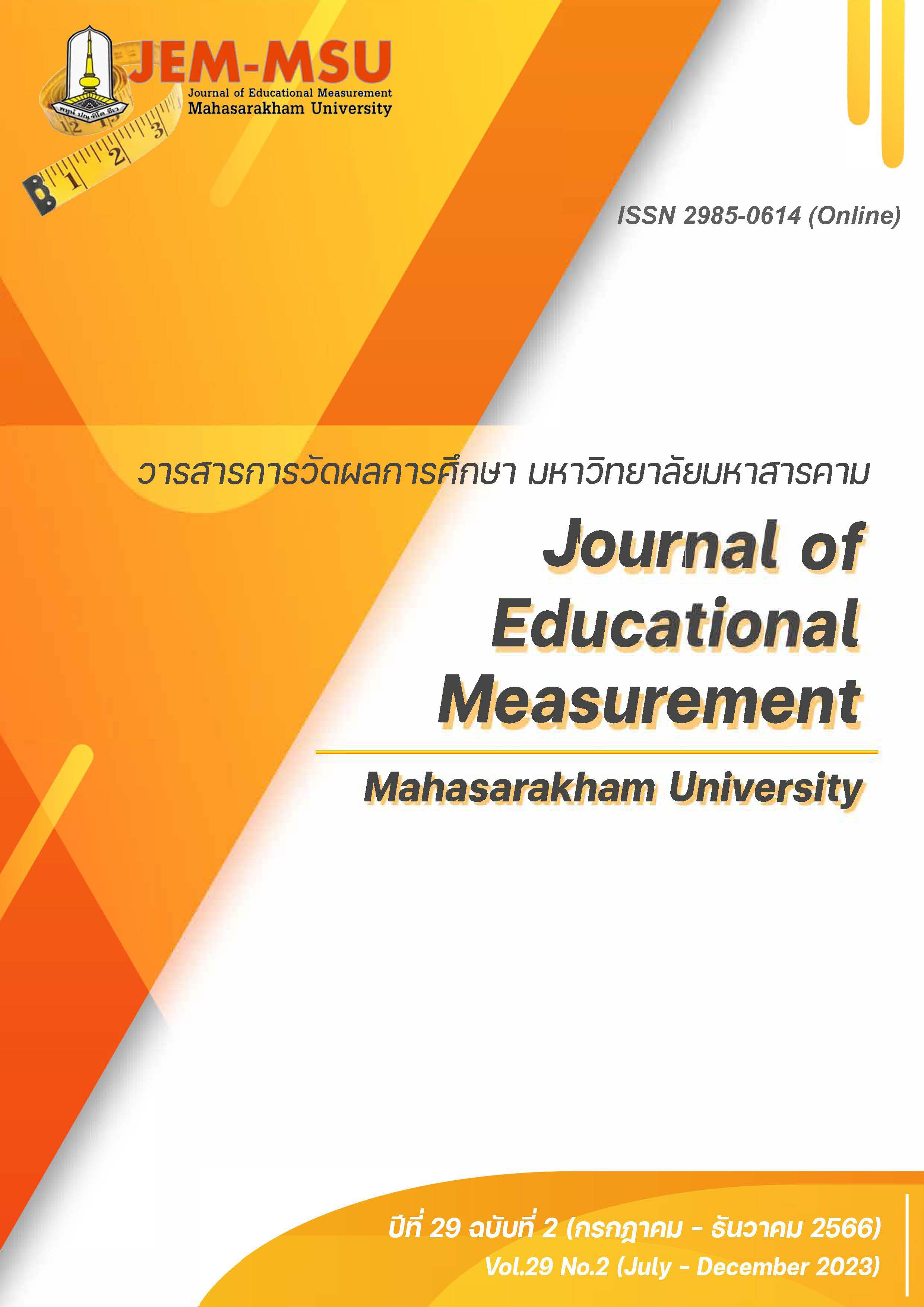Construction of Basic Scientific Process Skills Test of Grade 1 Students
Main Article Content
Abstract
The purposes of this research were 1) to develop a basic scientific process skills test that was consistent with the indicative behavior of scientific process skills, and 2) to analyze the quality of the basic scientific process skills test, which comprises item difficulty, item discrimination and reliability of the basic science process skills test. The sample comprised 42 grade 1 students of Hiranrat Phakdi Wittaya School in Nonthaburi Province, obtained through purposive sampling. The instrument was a 3-choice basic science process skills test. The data analysis followed the item analysis method according to classical test theories, by using Kuder-Richardson Method (KR20), to find content validity, item difficulty, item discrimination and reliability.
The results were as follows: The 22 items of the basic science process skills test had the index of consistency (IOC) with the indicative behavior of scientific process skills between 0.67 to 1.00, assessed by 3 experts in science education and primary education. Then, the test was tried out with the target group. The tryout yielded the item difficulty ranging from 0.20 to 0.80, item discrimination ranging from 0.20 to 0.60 and the total reliability was 0.78, which was in the high level. So, the test could be used to measure basic science process skills of grade 1 students.
Article Details

This work is licensed under a Creative Commons Attribution-NonCommercial-NoDerivatives 4.0 International License.
The content and information contained in the published article in the Journal of Educational Measurement Mahasarakham University represent the opinions and responsibilities of the authors directly. The editorial board of the journal is not necessarily in agreement with or responsible for any of the content.
The articles, data, content, images, etc. that have been published in the Journal of Educational Measurement Mahasarakham University are copyrighted by the journal. If any individual or organization wishes to reproduce or perform any actions involving the entirety or any part of the content, they must obtain written permission from the Journal of Educational Measurement Mahasarakham University.
References
American Association for the Advancement of Science. (1989). Science for All Americans: Project 2061. The American Association for the Advancement of Science, Inc.
Ebel, R.L. (1972). Why is longer test usually a more reliable test?. Educational and Psychological Measurement, 23, 249-253.
Ebel, R.L. (1978). Essential of Educational Measurement (3rd ed.). Prentice-Hall, Inc.
Miller, M.J. (2013). Reliability and Validity. http://michaeljmillerphd.com/res500_lecturenotes/reliability_and_validity.pdf
Rovinelli, R.J., & Hambleton, R.K. (1977). On the Use Content Specialists in the Assessment of Criteria Reference Test Item Validity. https://files.eric.ed.gov/fulltext/ED121845.pdf
Dahsah, C., & Seetee, N. (2017). Enhancing science process skills in early childhood years through inquiry cycle model. Journal of Education Naresuan University, 19(3), 343 – 355. (in Thai)
Jaratsutthisorn, C. (2002). Development of scoring rules of Integrated science process skill [Master’s thesis]. Srinakharinwirot University. (in Thai)
Jarenpornthip, A. (2007). Effects of Project Approach Experiences on Science Process Skills of Young Children [Master’s thesis]. Prince of Songkla University Knowledge Bank. http://kb.psu.ac.th/psukb/handle/2010/6361 (in Thai)
Lekhakula, A. (2014). Multiple choice question. PSU Medical Education Resources. https://des.cda.or.th/home/DownloadFiles?fileName=MCQ_Arnupa.pdf (in Thai)
Ministry of Education. (2008). The Basic Education Core Curriculum B.E. 2551. The Agricultural Co-operative Federation of Thailand, Ltd. (in Thai)
National Economic and Social Development Council. (2017). National Economic and Social Development Plan No.12 (B.E. 2560-2564). https://www.nesdc.go.th/ewt_dl_link.php?nid=6422 (in Thai)
National Research Council of Thailand. (2015). National Policy and Guidelines for Human Research. Chulalongkorn University Printing House (in Thai)
Office of the Education Council. (2017). National Education Plan B.E.2560-2579. Prigwhan graphics. (in Thai)
Panjanghan, M. (2021). Development of Basic Science Process Skills Test of Grade 6 students. Journal of Educational Measurement Mahasarakham University, 27(2), 221 – 235. (in Thai)
Peerasaksophon, S., Meechan, S., & Kitpoonwong, S. (2017). Study of the quality of the test SWUSAT used to select people to study in Srinakharinwirot University analysis by using conventional standard test theory and test answer theory. Educational and Psychological Test Bureau. (in Thai)
Pruekpramool, C. (2014). Assessing Science Process Skills. Suthiparithat Journal, 28(86), 352-364. (in Thai)
Saiyod, L., & Saiyod, A. (2004). Techniques of Educational Measurement (3rd ed.). Academic Promotion Center Publishing. (in Thai)
Senarat, B., & Senarat, S. (2018). Principles of educational measurement and evaluation (4th ed.). Apichat printing. (in Thai)
The Institute for the Promotion of Teaching Science and Technology (IPST). (2011). Framework and manual for early childhood science learning. http://earlychildhood.ipst.ac.th/wp-content/uploads/sites/25/2014/09/Science-Framework-for-ECE.pdf (in Thai)
Yousathaporn, R. (2008). Techniques and teaching methods in primary school. Chulalongkorn University. (in Thai)


